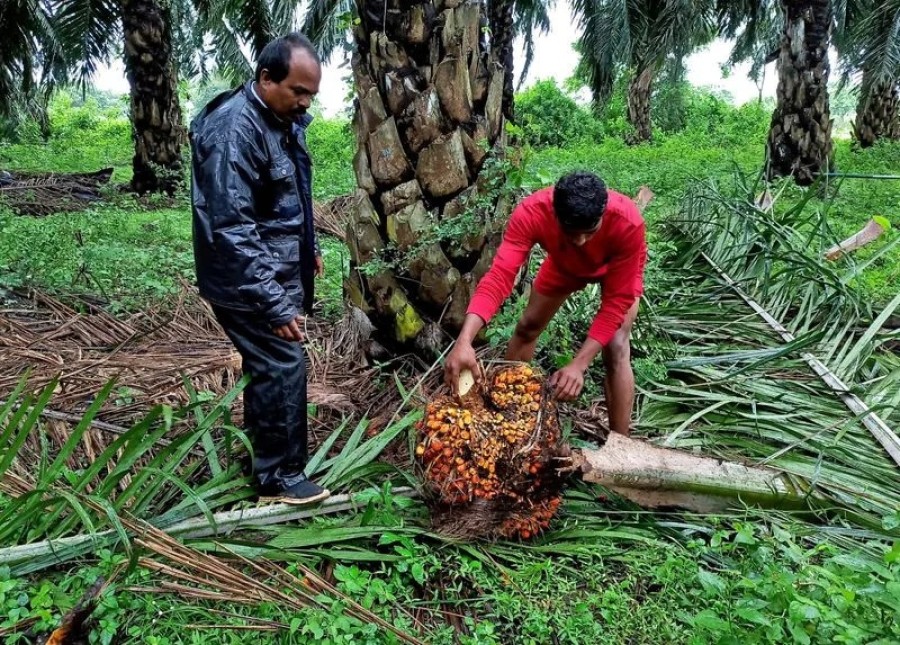India seeks to boost stagnant oilseed output to cut expensive veg oil imports

Image: Collected
India would step up efforts to boost local oilseed production, the finance minister said on Wednesday, as part of plans to cut pricey imports of vegetable oils from the world's top edible oil producers in Asia, South America and the Black Sea region.
India, the world's biggest vegetable oil importer, spent a record $20.8 billion on its edible oil purchases in the fiscal year to March 2023.
Stagnant oilseed production forces the country to import more than two-thirds of its annual vegetable oil consumption of around 23 million metric tons. Palm oil constitutes nearly 60% of India's total vegetable oil imports.
A strategy would be formulated to achieve self-reliance in oil seeds such as rapeseed, peanuts, sesame, soybean, and sunflower, Nirmala Sitharaman said while presenting the interim budget for the fiscal year starting on April 1. A renewed research to develop high-yielding varieties, widespread adoption of modern farming techniques, market linkages, assured purchases, value addition, and crop insurance would help boost oilseed production, she said.
She didn't mention the investment figure required for self-reliance in oilseeds.
Despite decades-long calls to lift local production, oilseed output has almost stagnated, unlike other crops such as rice and wheat.
India's oilseed production grew at an annual rate of 2.4% in the last two decades, even as demand jumped due to the rising population and prosperity.
Vegetable oil industry body the Solvent Extractors' Association of India requested the finance minister to earmark adequate financial support for the new programme to boost oilseeds production.
"Our goal is to reduce the current dependency on edible oil imports from 60% to 30% over the next five years," said Ajay Jhunjhunwala, president of the Solvent Extractors' Association of India.
India buys palm oil mainly from Indonesia, Malaysia and Thailand, while it imports soyoil and sunflower oil from Argentina, Brazil, Russia and Ukraine.
There is a need to raise import duty on edible oils to lift local oilseed prices and make it attractive for farmers, said a Mumbai-based senior industry official.
"Despite a 40-50% drop in edible oil prices, the current lower import duty structure persists. Import duties must be increased, given that soybean and rapeseed are trading below government-fixed buying prices," he said.
India, the world's biggest vegetable oil importer, spent a record $20.8 billion on its edible oil purchases in the fiscal year to March 2023.
Stagnant oilseed production forces the country to import more than two-thirds of its annual vegetable oil consumption of around 23 million metric tons. Palm oil constitutes nearly 60% of India's total vegetable oil imports.
A strategy would be formulated to achieve self-reliance in oil seeds such as rapeseed, peanuts, sesame, soybean, and sunflower, Nirmala Sitharaman said while presenting the interim budget for the fiscal year starting on April 1. A renewed research to develop high-yielding varieties, widespread adoption of modern farming techniques, market linkages, assured purchases, value addition, and crop insurance would help boost oilseed production, she said.
She didn't mention the investment figure required for self-reliance in oilseeds.
Despite decades-long calls to lift local production, oilseed output has almost stagnated, unlike other crops such as rice and wheat.
India's oilseed production grew at an annual rate of 2.4% in the last two decades, even as demand jumped due to the rising population and prosperity.
Vegetable oil industry body the Solvent Extractors' Association of India requested the finance minister to earmark adequate financial support for the new programme to boost oilseeds production.
"Our goal is to reduce the current dependency on edible oil imports from 60% to 30% over the next five years," said Ajay Jhunjhunwala, president of the Solvent Extractors' Association of India.
India buys palm oil mainly from Indonesia, Malaysia and Thailand, while it imports soyoil and sunflower oil from Argentina, Brazil, Russia and Ukraine.
There is a need to raise import duty on edible oils to lift local oilseed prices and make it attractive for farmers, said a Mumbai-based senior industry official.
"Despite a 40-50% drop in edible oil prices, the current lower import duty structure persists. Import duties must be increased, given that soybean and rapeseed are trading below government-fixed buying prices," he said.
Source: https://www.thenationalnews.com
Previous Story
- India navy rescues two hijacked vessels off Somalia...
- India, France agree on joint defence production -...
- Sony ends $10 billion merger with India's Zee,...
- India's market regulator probing three IPOs for inflating...
- India's Ayodhya Temple Is a Huge Monument to...
- Tata Motors urges India to keep hybrid tax...
- India's TCS to diversify to other markets amid...
- India's retail inflation rises to four-month high in...